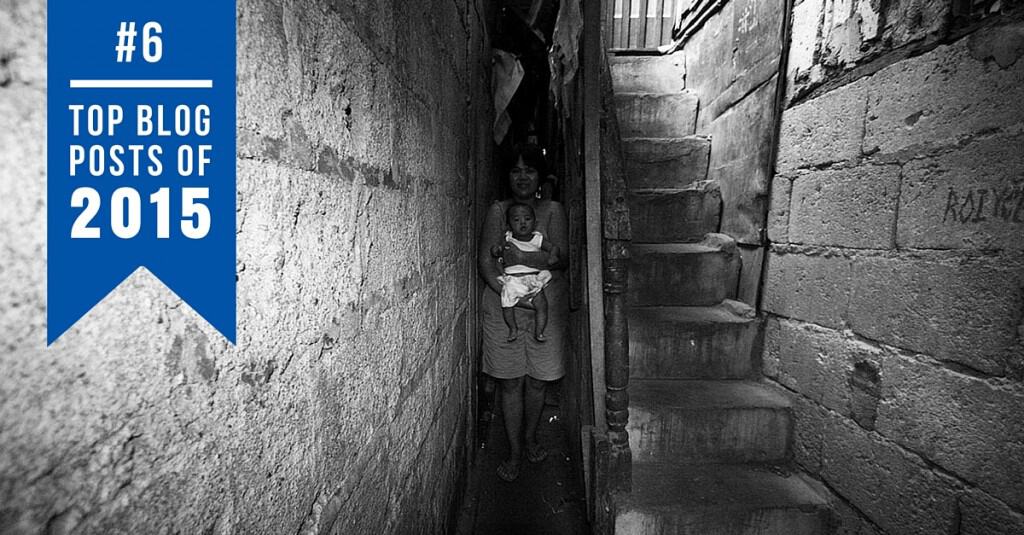We’ve all been there—stuck at that red light, stopped at the cross-walk, waiting on that corner. And despite our best efforts to avoid it, there we are: eye-to-eye with a person with a sign.
It doesn’t matter what the sign says. Suddenly, the dashboard needs dusting. Stations need changing. Facebook needs liking. Anything to avoid making eye contact with the person behind it.
Poverty is uncomfortable. And sometimes, it’s just easier to look away and pretend we can’t see.
Why are we so willing to meet faraway needs and yet so quick to avoid the opportunities God puts right front of us?
Because we don’t know what to do?
Because some problems aren’t ours to fix?
Because there’s a big difference between poverty here and poverty there?
Or because it’s just too hard to look?
Whether it’s a thousand miles away in a developing country or right there on the corner, the root of poverty is the same.
Poverty is not the lack of resources. It’s just lack. The lack of hope. Future. Belief. Dignity. And regardless of why it’s there or who’s to blame, it makes people feel invisible. Especially when no one wants to look you in the eye.
Poverty makes us feel hopeless.
It makes us feel worthless.
It makes us believe that we are not worthy to be seen.
In moments like these — when we’re tempted to ignore poverty — we have a choice to make. We can turn our heads and keep walking, or we can choose to stop and see.
A good friend of mine always says something that sticks:
“You will never see a set of eyes that God is not in pursuit of.”
It’s true. Behind every set of eyes is a person created in the image of our loving God. A person with a story. A person with a family. A person that’s been in love, made mistakes, lived through hard times, laughed till they cried. A person who still dreams of what they want to be when they grow up, misses their mom and skips over cracks in the sidewalk like they did when they were little.
A person Jesus sees.
Jesus was King of the uncomfortable. He knelt beside people with signs of every kind. He listened to stories, met needs and changed lives with His words and a few miracles that words can’t do justice. All to say, I see you. You matter. You — with your flaws and your quirks and your gifts and your worth. And for everything you lack, I am enough.
It’s as true for the young child in Uganda as it is for the old man on the corner. Jesus sees them both. Why shouldn’t we?
Jesus doesn’t ask us to fix everything. We can’t.
He doesn’t ask us to make judgment calls. We all need grace.
Instead, He says this:
“And if you give even a cup of cold water to one of the least of my followers, you will surely be rewarded.” (Matthew 10:42)
A cup of cold water. Not all the answers, an overnight cure or a 12-step plan. Something small. A means that gives us the opportunity to stop for a moment and make someone feel worthy. Not because of what they’ve done, but because of who they are and how God feels about them.
Maybe it’s a cup of hot coffee, a granola bar from your purse or the simple dignity of a smile and a hello to that man on the street. Perhaps it’s a quick note to the child you sponsor that reminds her she’s beautiful or proves he is brave. Maybe it’s letting that frazzled mom with the cart of kids ahead of you in the checkout line, or something so perfectly timed that it leaves a struggling someone with no doubt that they are not alone.
When we remember the person behind that set of eyes, these aren’t just actions. They are tangible, physical expressions of compassion that give us the chance to put a small crack in the wall between invisible and visible.
That’s what compassion is, isn’t it? Hurting with those who hurt. Noticing what others overlook. Being moved to action. Stopping to acknowledge each and every human being—rich or poor, young and old, strong or broken—as who they truly are. A child of the King, created with purpose and worthy because He’s crazy about them.
Poverty will always be uncomfortable. But the people who feel it most deserve to be seen. So let’s put down our phones. Let’s look people in the eye. Let’s have the courage to acknowledge the person behind the sign. The child behind the photo. The soul behind that set of eyes—hand-made in the image of a loving God who sees past the invisibility of poverty.
Let’s find that cup of cold water and go see who God sees.

